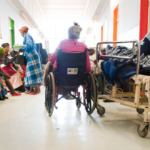- The justice department is currently reviewing submissions from activists, academics and civil society on an amendment Bill that, if approved, will make sex work legal.
- The draft Bill will then be debated by the National Assembly and after that the Council of Provinces, before the proposed changes can become law.
- For the fifth episode of Bhekisisa’s monthly TV programme, Health Beat, Mia Malan spoke with Deputy Justice Minister, John Jeffery, and United Nations special rapporteur on the right to health, Tlaleng Mofokeng, to unpack what life could look like for sex workers when their profession is legal.
Discriminating against people — because of their profession, sexuality or recreational activities — does nothing more than lead to the spread of a contagious disease — whether it’s COVID or HIV infections.
A case in point is sex workers. Health professionals often discriminate against sex workers, which makes them less likely to use health services — especially in countries where their job is illegal. Models show that decriminalising sex work can lead to a big drop — between 33% and 46% — in HIV infections among sex workers, likely because they won’t be scared to visit health facilities and so will have more access to getting tested or treated for HIV or ask for medicines that prevent infection, called pre-exposure prophylaxis (or PrEP for short).
When it’s legal for adults to buy or sell sex, it’s not only better for sex workers’ health but also for their physical safety, because they have a legal route to reporting violence or other crimes against them. Research shows that when gender-based violence (GBV) is rife, HIV infection rates are also high. Moreover, in places where sex work is not a crime, cases of GBV such as rape drop in the rest of the community too, studies have found.
It’s this overlap between health and law that makes the legalities around sex work such a prickly issue — and one a draft amendment Bill in South Africa could help to solve.
Activists have been fighting for the decriminalisation of sex work for years and the legal changes will likely also be incorporated in the country’s new action plan against HIV and sexually transmitted infections (STIs). South Africa’s new plan — for 2023 to 2028 — will be launched on 24 March, the South African National Aids Council (Sanac) told Bhekisisa (Sanac coordinates the drafting of the plan).
But there’s another win: two previously disagreeing government departments are now starting to align their thinking.
The health department has been asking for sex work to be decriminalised for years and in 2017 they came close to having it written into the country’s current five-year plan to curb HIV and STI rates, but the justice department stuck to their view that sex work is an offence — until recently.
Mia Malan asked Deputy Justice Minister, John Jeffery, and Tlaleng Mofokeng, a sexual health doctor and also the United Nations special rapporteur on the right to health, about what the decriminalisation of sex work could mean for South Africa — and why it signifies a meeting of minds between the health and justice departments.
[WATCH] The full interview with Tlaleng Mofokeng and John Jeffery here:
Mia Malan (MM): What does the decriminalisation of sex work mean to [activists like] you and and also to sex workers, after you’ve travelled such a long road on their behalf?
Tlaleng Mofokeng (Dr T): This is an important milestone for South Africa. It signifies the extent to which the government has listened to the voices of sex workers, who are at the forefront of many human rights violations. I became involved in the issue of sex workers’ human rights as a medical student when I had to assist sex workers [who experienced violence or needed healthcare], but who couldn’t freely get health services because of criminalisation.
MM: The period of public comment on the proposed changes closed at the end of January. What happens now?
John Jeffery (JJ): Now those public comments have to be considered and evaluated by the department. Then we’ll see whether we think any changes should be made to the Bill. Then it will have to go back to cabinet — what we’ll be asking for is permission to introduce it into Parliament. It will first go to the National Assembly, where they will have to follow a public participation process, which involves public hearings. If passed by the National Assembly, it’ll go to the National Council of Provinces. It’s still some way to go, but we hope to have it completed before the end of the [current cabinet’s] term.
MM: Decriminalising sex work could have a dramatic impact on gender- based violence. But what about the health of sex workers? What would the impact be on HIV infection rates, for example?
Dr T: The issue of [decriminalising] sex work is a human rights issue because it involves the principles of privacy, dignity, bodily integrity, autonomy and being able to have your own health in your hands — and have a healthcare system that responds to and supports those decisions. Criminalisation limits the extent to which sex workers can go to a health facility [and] when they’re there, it impacts on the quality of consultation [they get]. Let’s say a nurse asks: “How many sexual partners do you have?” They can’t answer that question honestly because of the judgement that comes [with that]. As healthcare providers we then miss an important opportunity to give [them] information or provide safer sex tools, and ultimately to assist sex workers with issues of consent and navigating relationships in a safer way, especially in a country that’s dealing with high rates of gender-based violence. Sex work also puts women at a higher risk because many are working outdoors.
MM: If we decriminalise sex work, would we see, for instance, special clinics for sex workers?
Dr T: Stigmatisation is a big issue. Criminalisation makes that even worse. When the system removes punitive measures to punish an individual, it sends a bigger message to society that it’s no longer acceptable to harass, call names and physically violate people because they are sex workers. Then we need to look at the public health policy. For example, do we have enough specialised sexual and reproductive health clinics for the general public? By the time we look into the needs for key populations like adolescents, sex workers and men having sex with men, we should ask whether we need a standalone clinic for each group or whether we incorporate them in a more comprehensive way within the existing public health service.
MM: How will sex work be regulated if it becomes legal?
JJ: The legislation that we’re introducing is not about regulation; it is simply about decriminalising. Other [existing] laws and regulations will [still] apply. For example, labour laws will apply if people are working in a brothel. Municipal by-laws will apply when considering the location of brothels or people selling sex on the street. The next part of the process will mostly deal with the issue of regulation. It’s a complicated issue, because it involves three spheres of government: local, provincial and national. We’ve got to look at what is best and most practical for South Africa.
MM: Will all districts have the same regulations or will they be able to make their own rules?
JJ: Zoning is a municipal function. Each municipality effectively decides because they already have laws in place. We need to look at the issue of a broader framework, but that will unfortunately only come later.
MM: What kind of laws do they already have in place?
JJ: There are municipal by-laws relating to zoning of businesses and where you can conduct business. For example, there are certain by-laws relating to soliciting on the street, which is where, unfortunately, a lot of sex workers have problems with law enforcement officers. So those would all be municipal by-laws specific to that place, and they can differ from place to place.
MM: What sort of implementation rules would health advocates like to see?
Dr T: There needs to be more training on human rights from an undergraduate level. We need to have nurses, doctors and healthcare professionals who understand the particular needs of sex workers. We also need [people to understand about] safe sex tools. Take the use of condoms, for example. Many sex workers have to use condoms, which they have to negotiate with a client. We need more tools that sex workers, especially women, can [not only] negotiate but also use themselves without having the added burden of making sure their client buys into it. We need to have pre-exposure prophylaxis for HIV freely available where people can get it. The issue of healthcare education is very important, because that will negate a lot of stigma.
MM: Will sex workers be taxed and how will that work?
JJ: The effect of decriminalising sex work is that people can make money the way they want to make it because it’s not a crime — whether you want to grow vegetables and sell those vegetables and make an income from that, or you want to give massages, or you want to sell sex. My understanding is that if people are earning over a particular threshold, they would be liable to pay tax. Sex workers would still be part of the informal economy, so Sars will probably have engagements with sex work organisations and discuss how they’re going to ensure that people who are meant to pay tax do so.
MM: If a sex worker feels they’ve been treated unfairly in a work environment, will they be able to go to the Commission for Conciliation, Mediation and Arbitration (CCMA)?
JJ: Already there’s been one CCMA case involving a sex worker. As I keep saying, the existing laws would apply. Any contract that is not kept is enforceable by the court. If the person is an employee, then in terms of working for a larger group, like a brothel, the Labour Relations Act would apply.
MM: The decriminalisation of sex work has been a long fight. Why has it taken so long?
Dr T: It had to be a very well considered decision. Some laws go back to the 1950s, and the law takes time to move. What many of us have called for is agility within the health system and also the legal system, so that we respond vigorously to research in new ways, not waiting decades to effect the change despite the evidence that we see. We are here now — and we’re glad to have reached this point.
MM: A few years ago, you were personally not in favour of decriminalising sex work. What changed your mind?
JJ: Originally my position supported partial decriminalisation, but I’ve had engagements with people, done research and read more. That’s what changed my position to seeing full decriminalisation [meaning neither selling nor buying sex is an offence] as the best option for South Africa.














